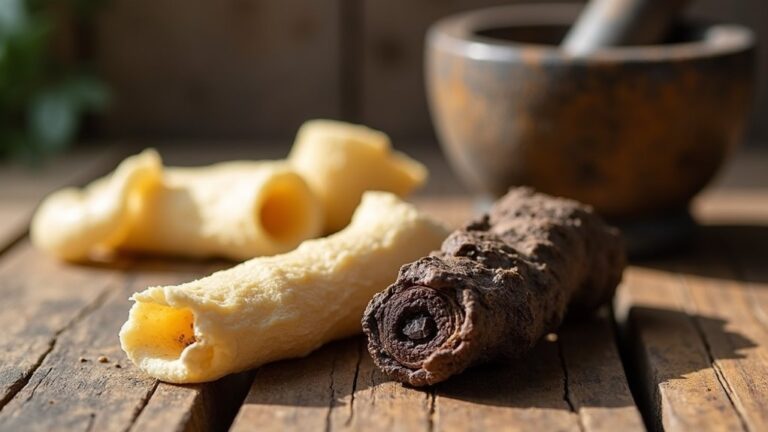Helicobacter pylori, a stubborn stomach bacteria, often causes bloating, nausea, or burning pain. While antibiotics work, natural remedies offer gentler options with fewer side effects. Probiotics like yogurt and kefir help restore gut balance, while honey especially manuka fights the bacteria directly. Garlic and green tea weaken H. pylori, and licorice root soothes irritation. Simple diet tweaks, like avoiding spicy foods, can ease symptoms. These approaches provide relief without harsh chemicals, making them worth exploring for long-term digestive health.
Helicobacter Pylori and Its Symptoms
Helicobacter pylori, often called H. pylori, is a type of bacteria that can sneak into the stomach and cause trouble. It thrives in acidic environments, disrupting the gut microbiome imbalance and triggering an inflammatory response.
Many people don’t realize they’re infected because symptoms can be mild or absent. When they do appear, they include bloating, nausea, stomach pain, or frequent burping. Some experience a burning sensation in the abdomen, especially when the stomach is empty.
Over time, untreated H. pylori can lead to ulcers or gastritis. Stress and poor diet may worsen symptoms, but the bacteria itself is the main culprit. Prompt detection helps prevent complications, so recognizing these signs matters. Comprehending how H. pylori operates makes it easier to address naturally.
The Role of Probiotics in Combating H. Pylori
While antibiotics are often prescribed to combat H. pylori, probiotics offer a gentler approach through restoring balance in the gut. These beneficial bacteria help counteract the harmful effects of H. pylori through crowding it out and strengthening the stomach lining.
Probiotic strain diversity is key, as different strains—like Lactobacillus and Bifidobacterium—work together to reduce inflammation and inhibit H. pylori growth. Research indicates probiotic supplementation effects include lowering bacterial load and improving digestion, making symptoms like bloating and nausea more manageable.
Unlike antibiotics, probiotics rarely cause side effects, rendering them a safer long-term option. Regular intake through foods like yogurt or supplements can support gut health, though results vary. Combining probiotics with other natural remedies can boost their effectiveness against H. pylori.
Honey as a Natural Antibacterial Agent Against H. Pylori
Honey, a golden staple in kitchens worldwide, packs more than just sweetness—it holds powerful antibacterial properties that can help combat H. pylori. Studies suggest raw honey antimicrobial properties can inhibit the growth of this stubborn bacteria, thanks to enzymes like glucose oxidase, which produces hydrogen peroxide.
Manuka honey effectiveness stands out, with its unique compound methylglyoxal (MGO) displaying strong activity against H. pylori. Unlike processed honey, raw or manuka varieties retain more active compounds, making them better options.
While honey shouldn’t replace medical treatment, integrating it into a balanced diet can support gut health. Its soothing texture also helps ease stomach irritation, offering relief alongside its antibacterial benefits. Always opt for high-quality, unpasteurized honey for the best results.
Herbal Extracts and Their Effectiveness Against H. Pylori
Certain herbal extracts show promise in fighting H. pylori infections due to their natural antibacterial properties. Garlic contains compounds that can weaken the bacteria, while green tea polyphenols can disrupt its growth.
Licorice root has also been studied for its capability to soothe the stomach lining and diminish H. pylori activity.
Garlic’s Antibacterial Properties
- Raw vs. Cooked Garlic: Raw garlic retains more allicin, but cooked garlic still offers benefits for digestive health.
- Dosage Matters: Consuming 1-2 cloves daily could help suppress *H. pylori*, though excessive intake can irritate the stomach.
- Combination Therapy: Pairing garlic with probiotics or honey potentiates its antibacterial effects.
While not a standalone cure, garlic’s *H. pylori* inhibition potential makes it a valuable addition to natural treatment plans.
Green Tea Polyphenols Impact
Though green tea is often lauded for its calming effects, its polyphenols—particularly epigallocatechin gallate (EGCG)—demonstrate potential in combating *H. pylori* infections. Studies suggest the green tea antioxidant effects help reduce stomach inflammation caused by the bacteria, while its green tea antimicrobial properties could inhibit *H. pylori* growth.
EGCG disrupts the bacteria’s ability to adhere to the stomach lining, rendering it more difficult for infections to take hold. Consistent consumption may also bolster the stomach’s natural defenses, though further research is required. Unlike harsh antibiotics, green tea offers a gentler approach with fewer side effects.
For those exploring natural remedies, incorporating green tea could be a simple, supportive step alongside other treatments. Its dual action—fighting bacteria and soothing irritation—makes it a valuable option.
Licorice Root Benefits
- Soothes the stomach: Reduces inflammation, easing discomfort from ulcers.
- Boosts immunity: Supports the body’s defense against infections.
- Protects the gut: Forms a protective layer over the stomach lining.
Unlike antibiotics, licorice root offers a gentler approach, making it a popular choice for those seeking natural remedies. However, it should be used cautiously, as excessive intake can raise blood pressure. Always consult a healthcare provider before starting any new treatment.
Green Tea and Its Potential to Inhibit H. Pylori Growth
Several studies suggest green tea could help decelerate the growth of *Helicobacter pylori*, the bacteria linked to stomach ulcers and inflammation. Its antioxidant properties, particularly from compounds like catechins, could weaken the bacteria’s ability to thrive in the stomach lining.
Green tea also offers antiinflammatory effects, which might ease irritation caused by *H. pylori* infections. Research indicates regular consumption could reduce bacterial activity, though it shouldn’t replace medical treatment. The warmth of green tea can also soothe discomfort, making it a comforting addition to daily routines.
While more studies are needed, its potential benefits make it a simple, natural choice to examine alongside professional care. Drinking it unsweetened maximizes its effects, as added sugars might counteract its healing properties.
Dietary Changes to Support H. Pylori Treatment
- Anti-inflammatory foods like turmeric, ginger, and leafy greens can soothe stomach lining and reduce discomfort.
- Fiber-rich foods such as oats, apples, and flaxseeds support digestion and can help prevent *H. pylori* from thriving.
- Probiotic-rich options like yogurt and kefir balance gut bacteria, aiding the body’s natural defenses.
Small, frequent meals can also lessen strain on the stomach. While dietary changes alone might not eliminate H. pylori they create a better environment for other treatments to work effectively. Avoiding processed foods and excess sugar further supports recovery.
Lifestyle Adjustments to Enhance Natural H. Pylori Remedies
Certain dietary changes can support the body’s healing process while managing H. pylori naturally.
Stress management techniques, such as meditation or gentle exercise, can also help reduce inflammation and improve gut health.
Combining these lifestyle adjustments with other natural remedies could amplify their effectiveness.
Dietary Changes for Healing
- Probiotic-laden foods (yogurt, kefir, sauerkraut) introduce good bacteria to outcompete *H. pylori*.
- Antioxidant-packed choices (berries, leafy greens, garlic) combat oxidative stress caused via infection.
- Soothing options (ginger tea, bone broth, oatmeal) ease discomfort while promoting healing.
Small, consistent dietary shifts—like exchanging sugary snacks for fresh fruit or selecting herbal teas over coffee—can make a noticeable difference over time.
The right foods work alongside other natural remedies to restore balance.
Stress Management Techniques
| Technique | Benefit | How to Practice |
|---|---|---|
| Mindfulness | Calms the mind, reduces anxiety | Focus on present moments daily |
| Deep Breathing | Lowers stress hormones | Inhale 4 sec, hold 4, exhale 6 |
| Gentle Movement | Improves digestion, eases tension | Walk or stretch for 10 minutes |
Regular practice strengthens resilience, creating a healthier environment for natural remedies to work. Even small adjustments, like pausing for a few mindful breaths, can make a difference. Consistency matters more than intensity. Over time, these habits build a foundation for lasting relief.
Conclusion
Natural remedies for *Helicobacter pylori* offer a gentle yet powerful shield against this stubborn infection. Probiotics, honey, and herbal allies like garlic and green tea work together like a healing army, restoring balance without harsh side effects. While these options support recovery, they shine brightest alongside smart diet and lifestyle changes. For those seeking a kinder path to gut health, nature’s toolkit provides both relief and lasting protection.





